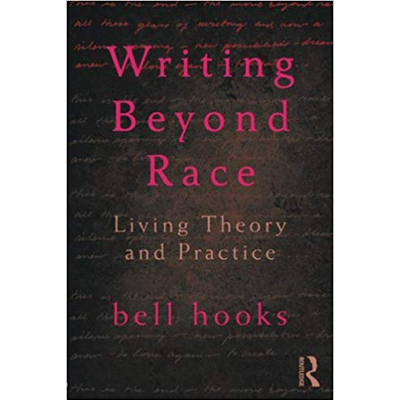
Writing Beyond Race: Living Theory and Practice by bell hooks
At first glance, this title reminded me of some people's claims that since Obama's presidency, we're living in a 'post-racial' society where racism has ceased to exist. That's certainly not bell hooks' intent – rather, she explores in these eighteen essays the enormity of racism yet offers her hopes for the future, with some surprising insights along the way.
White supremacist thinking, hooks demonstrates, still permeates our culture. Whites are still largely ignorant of African American lives and still promote white standards of beauty, i.e. lighter skin, straighter hair and European features. This results in internalized racism and lower self-esteem for African Americans. hooks says that racism kills, not always in overt assaults, but through constant stress that depletes health more gradually. She also decries the statistically higher number of African Americans watching more television, considering that especially black children absorb stereotypical portrayals of blacks and, again, white standards of beauty. (I wonder if this has changed much since the advent of streaming TV, but I'm afraid it hasn't.)
hooks observes that while Malcolm X called for decolonization and black self-determination, the white media focused more on his anger than his message. Even successful African Americans suffer with self-hatred, hooks says, since their assimilation leaves the economic power structures intact. I've shortened hooks' language – her preferred phrase is 'the imperialist white supremacist capitalist patriarchy,' which she admits brings a nervous laugh from lecture audiences. Yet she feels it's important to call out all the systems of oppression. I found her political language less problematic than her academic jargon, but that's just my personal taste.
I also appreciated hooks' powerful critiques of some very popular books and movies like Divine Secrets of the Ya-Ya Sisterhood and The Secret Life of Bees that offer 'celebratory woman bonding' but do nothing to challenge patriarchy. She criticizes the book and movie The Help, calling it a melodramatic fantasy not only pitting white and black women against each other, but 'creating a damning portrait of white womanhood' complete with child neglect, catfights and toilet humor.
Hooks also takes on The Immortal Life of Henrietta Lacks as a simplistic portrait of Lacks, failing to recognize the history of medical experimentation on black female bodies, and condescending in its treatment of family members. Speaking of the movie 'Crash,' hooks says it seems to talk about race in a radical new way but ultimately portrays 'the same old stereotypical images of blackness offered by the racialized pornographic white imagination.' She also critiques 'Precious' as a sensationalized treatment of incest and abuse rather than a vehicle for creating greater awareness and support for survivors.
Turning to the more positive effort to write beyond race, hooks recalls her parents' 'community of caring,' describing how she learned from them to find commonality with white people who have begun to unlearn the ways of white supremacy. Developing these relationships helps African Americans to build trust, to forgive and even to love. Hooks mentions her search among self-help books for something relevant to African Americans and decides to write her own, over the misgivings of her academic black colleagues. It's surprising to read hooks' writing about love within a critique of 'the imperialist white supremacist capitalist patriarchy,' but then again, it's hopeful for a future for all of us.
by Jan Hardy, Cataloging Specialist
